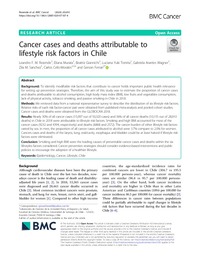Mostrar el registro sencillo de la publicación
Cancer cases and deaths attributable to lifestyle risk factors in Chile
| dc.contributor.author | Rezende, Leandro F. M. | |
| dc.contributor.author | Murata, Eliana | |
| dc.contributor.author | Giannichi, Beatriz | |
| dc.contributor.author | Tomita, Luciana | |
| dc.contributor.author | Wagner, Gabriela A. | |
| dc.contributor.author | Sanchez, Zila M. | |
| dc.contributor.author | Celis-Morales, Carlos | |
| dc.contributor.author | Ferrari, Gerson Luis de Moraes | |
| dc.date.accessioned | 2020-11-12T12:11:21Z | |
| dc.date.available | 2020-11-12T12:11:21Z | |
| dc.date.issued | 2020 | |
| dc.identifier.uri | http://repositorio.ucm.cl/handle/ucm/3176 | |
| dc.description.abstract | Background: To identify modifiable risk factors that contribute to cancer holds important public health relevance for setting up prevention strategies. Therefore, the aim of this study was to estimate the proportion of cancer cases and deaths attributable to alcohol consumption, high body mass index (BMI), low fruits and vegetables consumption, lack of physical activity, tobacco smoking, and passive smoking in Chile in 2018. Methods: We retrieved data from a national representative survey to describe the distribution of six lifestyle risk factors. Relative risks of each risk factor-cancer pair were obtained from published meta-analysis and pooled cohort studies. Cancer cases and deaths were obtained from the GLOBOCAN 2018. Results: Nearly 30% of all cancer cases (15,097 out of 50,320 cases) and 36% of all cancer deaths (10,155 out of 28,010 deaths) in Chile in 2018 were attributable to lifestyle risk factors. Smoking and high BMI accounted for most of the cancer cases (9232 and 4394, respectively) and deaths (6868 and 2572). The cancer burden of other lifestyle risk factors varied by sex. In men, the proportion of all cancer cases attributed to alcohol were 3.7% compare to 2.0% for women. Cancers cases and deaths of the larynx, lung, oral/cavity, esophagus and bladder could be at least halved if lifestyle risk factors were eliminated. Conclusion: Smoking and high BMI were the leading causes of preventable cancer cases and deaths within the six lifestyles factors considered. Cancer prevention strategies should consider evidence-based interventions and public policies to encourage the adoption of a healthier lifestyle. | es_CL |
| dc.language.iso | en | es_CL |
| dc.rights | Atribución-NoComercial-SinDerivadas 3.0 Chile | * |
| dc.rights.uri | http://creativecommons.org/licenses/by-nc-nd/3.0/cl/ | * |
| dc.source | BMC cancer, 20(1), 693 | es_CL |
| dc.subject | Epidemiology | es_CL |
| dc.subject | Cancer | es_CL |
| dc.subject | Lifestyle | es_CL |
| dc.subject | Chile | es_CL |
| dc.title | Cancer cases and deaths attributable to lifestyle risk factors in Chile | es_CL |
| dc.type | Article | es_CL |
| dc.ucm.indexacion | Scopus | es_CL |
| dc.ucm.indexacion | Isi | es_CL |
| dc.ucm.doi | doi.org/10.1186/s12885-020-07187-4 | es_CL |



